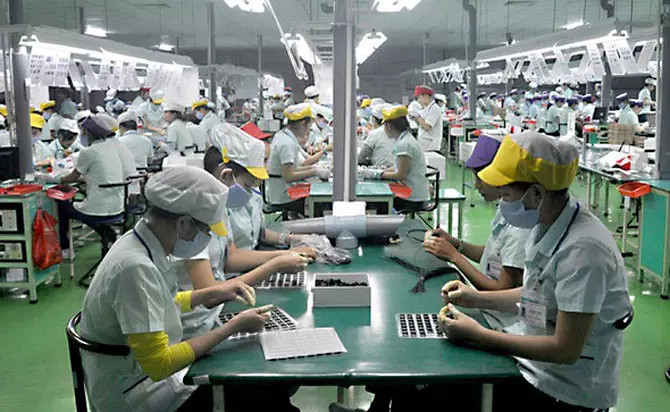
In early June, Samsung’s factory in Vietnam, the biggest production base of the group which puts out 60 percent of all Samsung smartphones, decided to reduce production from five days to three days a week.
Sources from South Korea said Samsung has 50 million smartphones in distributors’ stock. The manufacturer initially planned to put out 334 million smartphones in 2022, but has lowered the figure to 270 million, and the inventory level is equal to 18 percent.
According to experts, in general, Samsung maintains 10 percent of its output in the stock of distributors. But the current figure is double, 50 million products instead of 27 million. This shows that the giant has overly high inventories, and market demand is weak.
The global economic growth slowdown has affected large multi-national corporations, forcing them to scale down production and business.
Nguyen Quoc Viet, deputy head of the Vietnam Institute for Economic & Policy Research (VEPR) under the Hanoi National University, said the growth decline, which could become a recession, has caused the largest economies, which are large trade partners of Vietnam, to reduce production capacity and tighten their consumption.
This will put difficulties on Vietnam’s effort to maintain growth of industrial production for exports and affect economic growth in H2 2022.
In the first half of the year, Vietnam controlled the Covid outbreak, reopened the economy and ensured macroeconomic stability.
In May 2022, Vietnam’s PMI (purchasing manager’s index) increased to 54.7 from 51.7 in April, while the total import-export turnover reached $305 billion, an increase of 15.6 percent, which shows an impressive recovery.
As of early June, credit had grown by 8.15 percent compared with late 2021, an increase of 17.09 percent over the same period last year, which has helped activate business activities and create momentum for macro indicators.
However, Viet still faces difficulties in the last months of the year. The biggest worry is the pressure on inflation and global uncertainties, causing risks to most major markets in the world as well as Vietnam.
The PMI in the first half of June saw a decline compared with May. The import-export turnover increased, but the import volume of goods through Vietnam’s seaports in H1 decreased considerably if compared with recent years.
The disruption of supply chains and China's zero-Covid strategy have caused difficulties for Vietnam in some business fields as the country has been relying on imported materials.
Risks, uncertainties
Statistics show a decline in the export of some products in May 2022. Seafood exports, for example, decreased by 5.99 percent, vegetables and fruits 20.99 percent, coffee 10.49 percent, pepper 13.71 percent, sweets and products from cereals 2.46 percent, clinker and cement 49.97 percent, mobile phone and accessories 28.79 percent, and camera and accessories 19.19 percent compared with the month before.
Regarding export of processed food and foodstuff, enterprises said input material prices have been escalating, while they cannot lift the prices of finished products as contracts were signed 6-8 months ago. Meanwhile, they are not taking new orders from the US and Europe because they fear input price fluctuations and don’t have capital to store materials.
In addition, the move by the State Bank of Vietnam (SBV) of selling dollars to stabilize the dong/dollar exchange rate and the macro economy is also an influential factor. This will make Vietnam’s products lose competitiveness if compared with regional rivals and put difficulties for export companies in the second half of the year.
Enterprises are also facing difficulties in seeking domestic credit sources. Many enterprises lack capital and they cannot access bank loans with low interest rates. The deposit and lending interest rates are predicted to increase in the time to come as a result of pressure on inflation and this will also affect production and business.
State budget collections were high in the first five months of the year (57.1 percent of estimates). Economists says the government needs to accelerate stimulus packages for economic recovery in the last six months of the year and step-up implementation of public investment to give momentum to the national economy to develop.
Tran Thuy